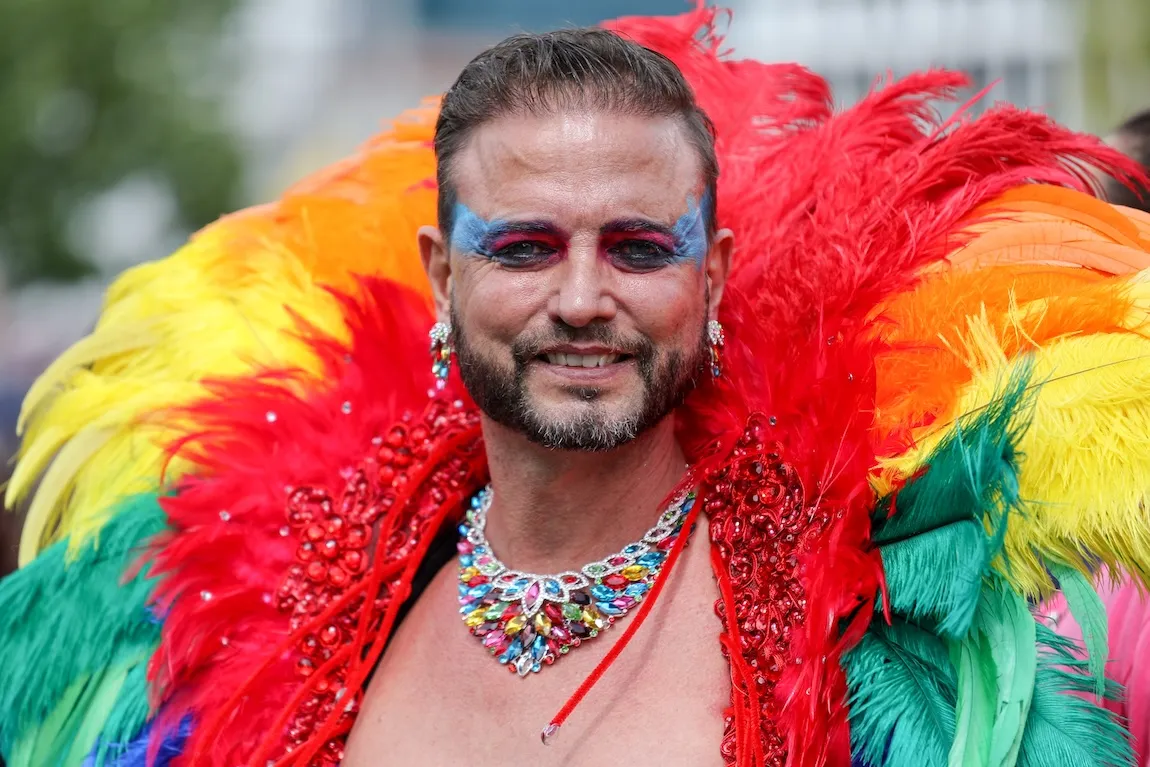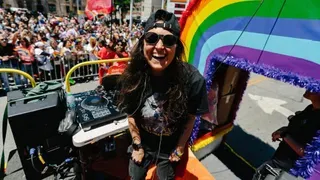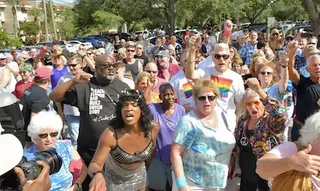February 23, 2014
Ridgely Brings Event Experience to SF Pride
Kilian Melloy READ TIME: 5 MIN.
The new executive director of the organization that oversees San Francisco's Pride parade and festival has been on the job just over a month, and is concentrating on sponsorships and retaining the group's longtime contractors to ensure a safe and fun event at the end of June.
In a wide-ranging interview with the Bay Area Reporter last week, George Ridgely said that his background in helping run large outdoor events in the city means that he already knows the major players in terms of working with city officials, law enforcement, and community groups.
Ridgely previously served as operations manager for the Bay to Breakers foot race and was executive director of the Castro Street Fair. Those two events, combined with running his own gala production company, Pink Collar, means that he has eight or nine years of experience.
Ridgely, who said he applied for the executive director position for the third time following last year's resignation of CEO Earl Plante, said that he had long sought the challenge of running one of the largest Pride parades in the world.
"I applied before, third time's a charm," Ridgely said. "I've always been interested in it. As an LGBT person, I had my eye on Pride. I love what I do and there are only so many large scale events to do."
Ridgely, 50, identifies as gay but likes the word "queer," he said.
He said that it doesn't bother him that he was twice passed over for the top job. In the past, it was different boards of directors that made the final hiring decisions.
"In all of those situations the board did a very thorough job. I met with operations people and staff and I feel they made their decisions based on the information they had," he said.
After the last few years of upheaval with the San Francisco LGBT Pride Celebration Committee, Ridgely is looking to focus on the parade and festival before branching out into other endeavors. Fundraising and soliciting sponsorships, he explained, would remain a year-round activity. Previous executive directors had sought to incorporate speaker series and other events throughout the year, but financial and management issues have prevented those from taking place in recent years.
Ridgely said he has a "pretty well-rounded idea of what takes place" at Pride. Over the years he has marched in the parade, been on the main stage, attended the VIP party inside San Francisco City Hall, and gone to the festival. Last year, he had a unique vantage spot inside the bunker on Turk Street inside the Office of Emergency Services.
"I'm so glad I did that now," he said.
Sponsorships
The Pride organization relies on corporate sponsorships to cover much of the cost of the parade. The organization, which has a $1.7 million budget, also receives some city funding. In addition to the controversy last year of the previous board's rescinding grand marshal honors for Chelsea Manning, an Army private who was convicted of leaking classified documents to WikiLeaks, there was some debate in the community about whether Pride should seek corporate sponsorships, which is also the main reason Pride remains a free event, although donations are requested at the festival gates.
"I have not found the temperature to be anti-sponsorship." Ridgely said of the board. "I think everyone on the board realizes that sponsorships are key to the event."
Funders and sponsors, he continued, want to meet Pride leadership and the first thing they ask, he said, is about his background.
In recent years, social media and tech companies have been Pride sponsors - Facebook CEO Mark Zuckerberg was spotted in last year's parade - but since then tenants and others have taken issue with what they see as tech workers forcing out longtime residents and an uptick in evictions that many link to the tech sector as well as the development of several market-rate condo buildings.
Ridgely said that he would welcome such companies as Pride sponsors.
"I hope they would take the opportunity to show their support," he said. "I am aware of the PR around tech companies but I think supporting Pride would go a long way to show that they are part of the fabric of the community."
Contractors
The Pride Committee depends on contractors to run everything from the parade to the main stage to the beverage booths. Most of them have worked for San Francisco Pride for years and almost all are returning, Ridgely said.
At times during the interview, Ridgely used the term staff to refer to contractors.
"Contractors equal staff," he said. "We're all a team."
Audrey Joseph, the longtime main stage producer who has said at various times over the years that she would not come back, will be returning, Ridgely said.
"I love working with Audrey," he added.
The feeling apparently is mutual. In an email, Joseph said she was very happy that Ridgely was hired as executive director.
"Working with George is like a breath of fresh air - finally someone who speaks my language and who understands the challenges," Joseph said. "I am very excited about George at the helm and feel confident that the contractors will get what they need and their opinions will be respected."
Marsha Levine is the longtime parade manager. Last year she was elected to the Pride board of directors where she is vice president but both she and Ridgely said that there would not be a conflict of interest. In an email to the B.A.R., Levin said that she would "make a strong and conservative practice to recuse myself from voting on those items that would seem in conflict with my role as parade manager."
Levine also said that Pride's bylaws, as well as the California Nonprofit Corporation Code, allow an organization to have a ceiling of 49 percent interested persons serve on a board of directors. "The Controller's office noted this was allowable in their report of 2010," she added.
"Our legal counsel did not see this as a concern, unless we went past the ceiling," Levine said.
Ridgely said that most of all, he is not looking to "reinvent the wheel" and that he needs to see and experience this year's Pride parade and festival before possible changes are instituted in the next cycle. He noted that there is a "huge" change in the board this year - in addition to several new members elected last fall, the board appointed two others last week and the Pride Committee is looking for three more people - as well as him being new to the job.
"The change in leadership is the big change in Pride for this year," he said.
Asked whether the Pride parade and festival are still needed, Ridgely was unequivocal. He said that his sister, niece and nephews came out for Pride about six years ago when the kids ranged in age from 12-16.
"They still talk about it. It was still impactful," he said. "I've been to Pride celebrations for 30 years but there are still a lot of kids" for whom "this is their first experience and I think it's important for them."
He added that San Francisco's event is the only televised parade in the U.S., and that the webcast draws over 400,000 viewers.
"We reach people way outside our metropolis," he said. "There are queers in small towns who watch the parade."
Kilian Melloy serves as EDGE Media Network's Associate Arts Editor and Staff Contributor. His professional memberships include the National Lesbian & Gay Journalists Association, the Boston Online Film Critics Association, The Gay and Lesbian Entertainment Critics Association, and the Boston Theater Critics Association's Elliot Norton Awards Committee.





